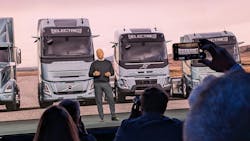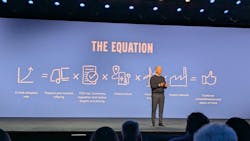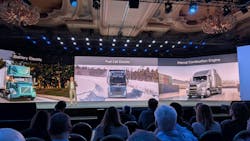Volvo: Transportation and logistics are critical to our modern and future worlds
All the innovative, cutting-edge technology displayed across Las Vegas during CES last week wouldn’t be possible without transportation and logistics—industries amid their own advanced technology moments. Volvo Group used North America’s most prominent annual technology show to boast about its roots and role in modern life and the future.
Mack Trucks, a brand synonymous with American toughness, is celebrating 125 years as its Swedish parent company, Volvo Group, is bragging about how much it and the nation of Sweden are doing for the world.
“It’s great for us also to be here in the United States, where we have such a long and strong history,” Martin Lundstedt, Volvo Group CEO, said during his January 8 CES keynote address at a packed Venetian ballroom on the Las Vegas strip.
Building a global future on its history
“Volvo Trucks has been present here for more than four decades. Another of our iconic brands, Mack Trucks, who literally built the United States, is turning 125 years this year. I can tell you that there will be great news coming along this year for Mack Trucks. And we are investing more than ever in the United States.”
He noted that Volvo Group, whose stateside brands include Mack, Volvo Trucks North America, and Volvo Construction Equipment, has invested “billions of dollars” in its industrial footprint and technology on the continent.
See also: History of North American truck OEMs
“We are one of the largest producers of trucks, buses, or construction equipment, drive trains, propulsion systems in the world,” Lundstedt said. “And why are we here at CES?
“Because you might not think about it all that much, but transport and logistics is what makes modern life possible. We have the whole group. We are using technology to innovate and transform the very foundation of the transportation industry. And with our scale, what we do has a major impact across the globe.”
He described a world without transport: hospitals without medicine, empty grocery stores, garbage piled outside homes. “This is how important transport and logistics is for society, for business, and for people,” Lundstedt said. “It is literally the lifeline that drives prosperity.”
With more than 70% of U.S. goods moved by truck, the global CEO said transportation binds our society, fuels the economy, and enriches the world in countless ways.
“The rule is as simple as it is important: The more advanced logistics a country or a region has, the higher GDP per capita. It is a straight line.”
However, transportation has “negative side effects, such as climate impact, pollution, congestion, noise. We have improved those a lot over the last many years, but there is still a lot to continue to address the transformation to a fossil-free and safe transport system.”
Opportunities of prosperity on the road to zero
That transformation is underway. Volvo Trucks North America has sold the most over-the-road electric Class 8 trucks in the U.S. And Mack offers refuse and medium-duty EVs. The OEM is also partnering with its rivals to solve the zero-emission challenges long-haul trucking faces.
But the road to net zero, which Volvo Group wants to reach by 2040, could turn the adverse side effects into opportunities, Lundstedt said.
See also: Volvo sees fleet profitability paved upon its path to zero
“It will be a bumpy road. It will take some time. But it will happen,” he said, predicting a “new level of prosperity and sustainability for real. And the companies and people that can make it happen will get rewarded.”
Volvo had a roughly 40% market share of heavy-duty EV sales in 2024. It was first to market with its Class 8 VNR Electric truck. There are now more than 620 on North American roads, operating for 71 fleets in 19 states and provinces, VTNA told FleetOwner this week.
While its regional BEV trucks have seen early successes in certain operations, the OEM has a three-path approach to decarbonization: battery-electric, fuel-cell electric, and renewable internal combustion engines.
Electric Volvo trucks operate in 49 countries worldwide and have racked up more than 82 million miles, according to Lars Stenqvist, Volvo Group’s chief technology officer, during CES.
“We are on a transformation journey, and where we are going, our trucks, buses, and construction equipment will be 100% fossil-free—but also 100% safe and 100% more productive,” he said during the keynote address.
Stenqvist noted that Volvo Group has 15,000 engineers working on this complicated net-zero mission. But it isn’t easy. “They are key players on this journey because to decarbonize our industry, there’s no single magic solution—no silver bullet. It’s about having the right tools for the right job to be done.
“Different sectors in the transportation industry need different solutions—whether it’s construction sites in cities, transporting goods across the country, or moving people in buses,” he continued, noting that the solutions must match the various global landscapes.
Three zero-tailpipe paths to 2040
While Volvo Group believes most global regions will be electrified by 2040, some will be better served by hydrogen fuel cells or renewable-powered combustion engines. The OEM is also investing in software-defined vehicle platforms (partnering with Daimler Truck on the venture) and heavy-duty autonomous technology (partnering with Aurora with its Volvo Autonomous Solutions venture).
Volvo Trucks’ new flagship North American Class 8 vehicle, the all-new VNL that debuted in 2024, was created to be a platform for future technologies, Peter Voorhoeve, VTNA president, said last year.
“We’ve listened to our customers here in North America, and we’ve looked at the requirements here in North America for the next coming decades, and we put all that into the truck behind us,” Voorhoeve said during the VNL’s launch. “This truck is designed to change everything.”
That change faces many challenges here in North America, as battery-electric adoption has faced more pushback than in Europe. But Lundstedt said later in his address that he believes the American spirit and Swedish innovation are primed to build on rich legacies on both sides of the Atlantic.
“We have a fantastic heritage and history in many ways,” he said. “Mack Trucks built America—from the Statue of Liberty to supporting troops during World War I and II and up to today. And across the pond, Volvo was instrumental in Swedish success—going from a rural economy to an industrial high-tech one.”
See also: A look back at historic Mack Trucks
Lundstedt said that this global transportation transformation is not easy but will come with new opportunities.
“Succeeding is about aligning with a long-term vision,” Lundstedt said. “It’s about utilizing innovation and technology, creating business models. It is about working together across sectors. But more than anything, it is about dedicated and passionate people coming together to completely reinvent and transform our world.”
A Swedish moment
Perhaps to remind the international CES audience what his Swedish company can achieve for the world, Lundstedt brought along some political muscle.
“Sweden, I would say, is quite uniquely positioned for what is to come,” Deputy Prime Minister Ebba Busch told the crowd. “Our companies have a global outlook, and they are truly indispensable in the new technological value chains that are emerging.”
She noted how Swedish mobility and communications companies (such as Ericsson and Spotify) integrate different technologies into complex industries. “We excel in clean technologies, leading the fossil-free transition—including green steel production. And all this powered by an electricity system that is 98% fossil-free. Our companies are climate heroes.”
“You might think this is bragging, but I learned from an American yesterday that if it’s facts, it’s not bragging.”
About the Author
Josh Fisher
Editor-in-Chief
Editor-in-Chief Josh Fisher has been with FleetOwner since 2017. He covers everything from modern fleet management to operational efficiency, artificial intelligence, autonomous trucking, alternative fuels and powertrains, regulations, and emerging transportation technology. Based in Maryland, he writes the Lane Shift Ahead column about the changing North American transportation landscape.





